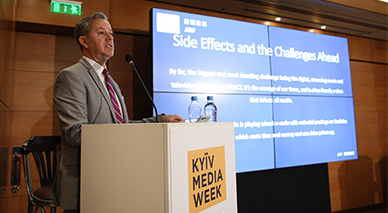
On September 18 at KYIV MEDIA WEEK 2018 international media forum Neil Landau, a famous American screenwriter, script consultant and producer, a person with huge experience in the TV show industry, presented his workshop “TV shows as the new cinema.” He has worked on such series as Melrose Place, Undressed,The Secret World of Alex Mack, Young and the Restless, Twice in a Lifetime, etc.
Most of Neil’s report was dedicated to the influence of digital television on global cinema. Now television has stopped “servicing” the interests of some specific local market (at least this is true for the markets of North America, Europe and pan-Asian region). “Television is a global market. And each show we are working on in the US is targeted for the international audience,” Neil says.
Everything started in 2004 when Janet Jackson bared her breast at Super Bowl live broadcast. And everybody wanted to watch this moment again and looked for the video on the internet. The same year the most expensive series of the time Lost was launched; its pilot cost about 10 million USD. And in 2005 three former PayPal employees founded something which overturned the idea of traditional methods for video delivery and became the biggest video platform in the world – it was YouTube. Neil Landau considers this period a turning point after which it became clear that domination of cinema will never be the same as before.
Andafterthat, astheysay, ittookoff: onlinevideoplatformsstartedemergingwhichradicallychangedthewaystheaudienceconsumesaudiovisualcontent.Renowned and cult directors, producers and actors, which previously wouldn’t be caught dead making a series, started shifting from cinema into TV show industry more and more often. The number of series started growing exponentially (over 500 new English-language series in 2018 only in the US), creating the “series bubble” effect which, in Landau’s opinion, will burst pretty soon. “Digital Darwinism” is going to happen and only the best TV shows will survive, i.e., those with deeper characters, sharper conflicts, more twisted plot and, naturally, higher-quality visuals.
However, according to Neil Landau, this doesn’t mean that TV will push the cinema out in the nearest future. Most probably some convergence and synergy will happen among these two segments of audiovisual production, cinema and series. Though they were considered totally different before, they become more and more similar as the time passes.